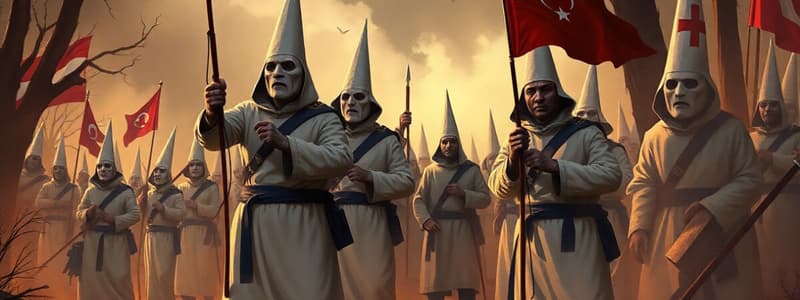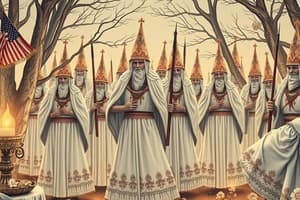Podcast
Questions and Answers
What were the overarching goals of the Ku Klux Klan?
What were the overarching goals of the Ku Klux Klan?
- To promote social and economic equality for all citizens
- To uphold the principles of Democracy and Reconstruction
- To protect African Americans from violence and discrimination
- To prevent African Americans from exercising their political rights and restore white supremacy (correct)
- To establish a new government in the South
What was the main way the Klan terrorized African Americans?
What was the main way the Klan terrorized African Americans?
They used violence, often in the form of beatings, burnings, and murder, to intimidate and scare African Americans from participating in society and politics.
The Supreme Court in the Slaughterhouse cases ruled that states could not violate individuals' civil rights as guaranteed by the Fourteenth Amendment.
The Supreme Court in the Slaughterhouse cases ruled that states could not violate individuals' civil rights as guaranteed by the Fourteenth Amendment.
False (B)
What were the two main reasons the Republican Party lost power and support in the South?
What were the two main reasons the Republican Party lost power and support in the South?
The Compromise of 1877 marked the end of ____ in the South.
The Compromise of 1877 marked the end of ____ in the South.
Explain the concept of 'redemption' as it was used by the Democrats.
Explain the concept of 'redemption' as it was used by the Democrats.
Which of the following was NOT a direct consequence of the Compromise of 1877?
Which of the following was NOT a direct consequence of the Compromise of 1877?
The Compromise of 1877 was a controversial agreement that involved a deal between the Democratic and Republican parties to settle the contested election results.
The Compromise of 1877 was a controversial agreement that involved a deal between the Democratic and Republican parties to settle the contested election results.
What lasting negative impacts did the end of Reconstruction have on African American civil rights and political participation in the South?
What lasting negative impacts did the end of Reconstruction have on African American civil rights and political participation in the South?
Flashcards
Redemption
Redemption
The movement by Southern Democrats to regain control of their state governments after Reconstruction, marking the end of federal involvement in the South.
Panic of 1873
Panic of 1873
A period of economic decline characterized by decreased business activity and widespread unemployment, triggered in 1873 by a financial crisis.
Home Rule
Home Rule
The ability of a state government to govern itself without excessive federal interference.
Enforcement Acts
Enforcement Acts
Signup and view all the flashcards
Ku Klux Klan
Ku Klux Klan
Signup and view all the flashcards
Compromise of 1877
Compromise of 1877
Signup and view all the flashcards
Reconstruction
Reconstruction
Signup and view all the flashcards
Radical Reconstruction
Radical Reconstruction
Signup and view all the flashcards
Reconstruction Era
Reconstruction Era
Signup and view all the flashcards
Fourteenth Amendment
Fourteenth Amendment
Signup and view all the flashcards
Fifteenth Amendment
Fifteenth Amendment
Signup and view all the flashcards
Scalawags
Scalawags
Signup and view all the flashcards
Carpetbaggers
Carpetbaggers
Signup and view all the flashcards
Ulysses S. Grant
Ulysses S. Grant
Signup and view all the flashcards
Samuel J. Tilden
Samuel J. Tilden
Signup and view all the flashcards
Rutherford B. Hayes
Rutherford B. Hayes
Signup and view all the flashcards
Reconstruction Plans
Reconstruction Plans
Signup and view all the flashcards
Reconstruction as a Failure
Reconstruction as a Failure
Signup and view all the flashcards
Reconstruction as a Success
Reconstruction as a Success
Signup and view all the flashcards
Centralized Government
Centralized Government
Signup and view all the flashcards
Federalism
Federalism
Signup and view all the flashcards
Voter Disenfranchisement
Voter Disenfranchisement
Signup and view all the flashcards
Sharecropping
Sharecropping
Signup and view all the flashcards
Currency Reform
Currency Reform
Signup and view all the flashcards
Amnesty
Amnesty
Signup and view all the flashcards
Gold Standard
Gold Standard
Signup and view all the flashcards
Southern Redeemers
Southern Redeemers
Signup and view all the flashcards
Reconstruction
Reconstruction
Signup and view all the flashcards
Voter Suppression
Voter Suppression
Signup and view all the flashcards




